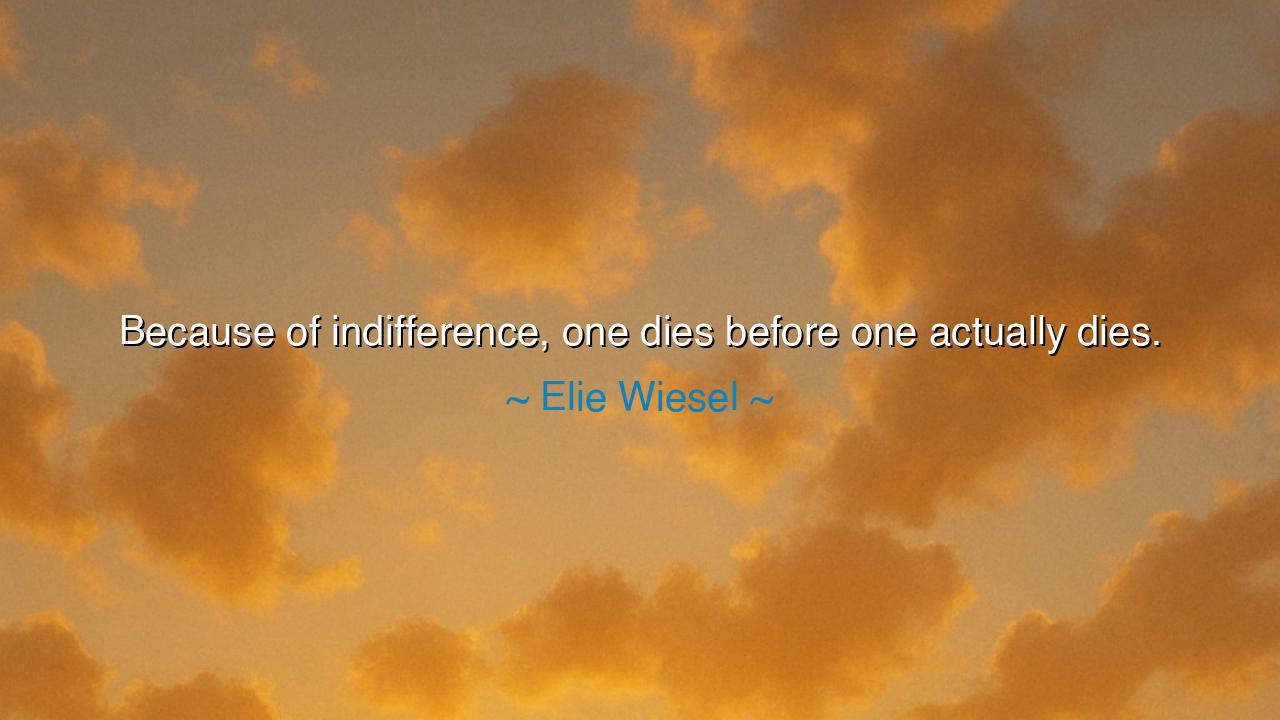
Because of indifference, one dies before one actually dies.






When Elie Wiesel declared, “Because of indifference, one dies before one actually dies,” he was not merely speaking of physical death, but of the far greater death of the spirit—that silent decay that begins when compassion fades and the heart grows cold. Wiesel, a survivor of the Holocaust, knew this truth not as theory, but as lived experience. He had seen men and women stripped of everything but breath; he had witnessed how cruelty destroys, yet he also saw something even more insidious than cruelty itself—indifference, the absence of care. It was this indifference that allowed evil to thrive unchecked, that made the suffering of millions possible. To him, the death of empathy was the beginning of the death of humanity itself.
The origin of this quote lies in Wiesel’s lifelong mission to awaken moral consciousness in a world that had fallen asleep to suffering. After surviving Auschwitz and Buchenwald, he dedicated his life to being a witness, to ensure that the atrocities of the Holocaust would never be forgotten or repeated. He spoke not only of the crimes of the perpetrators but also of the silence of the bystanders. The tragedy of his time, he said, was not only the hatred of the wicked, but the silence of the good. Indifference—this cold detachment, this refusal to feel or act—was a form of spiritual suicide. Those who cease to care, he believed, cease to live fully. Their bodies may still walk the earth, but their souls have already turned to stone.
In the style of the ancients, we might say: indifference is the death of the flame within. It is the extinguishing of that divine spark that connects one soul to another. A person may endure suffering and remain alive; indeed, suffering can deepen compassion. But the one who looks upon suffering and feels nothing has already perished in essence. Such a one lives without love, without outrage, without purpose. To live indifferently is to exist without the fire of humanity. This is the death that comes before the grave—the death of meaning.
History, too, bears the heavy proof of Wiesel’s warning. When the world stood silent as the Holocaust consumed millions of lives, indifference became as deadly as the weapons themselves. Nations turned away from the cries of the oppressed, not out of hatred, but out of apathy—and that apathy paved the way for catastrophe. In our own time, we see this pattern repeated whenever people avert their eyes from injustice: when the poor are ignored, when the persecuted are abandoned, when the environment cries for help and the world turns its back. Each act of indifference, no matter how small, adds another stone to the tomb of the collective soul.
But there are also those who have broken this cycle—those who refused to die before dying. Consider the story of Oskar Schindler, a man who began as a profiteer in Nazi Germany but whose heart was awakened by the suffering of the Jewish people. In the midst of indifference and fear, he chose compassion. He risked his life and fortune to save over a thousand Jews from death. Schindler, by choosing to care, kept his humanity alive. His story shows that to act with compassion is to resurrect the soul, to breathe life where apathy once ruled. One single act of empathy can counter the decay of indifference and ignite the spark of hope in countless others.
Wiesel’s words call to every generation: do not sleepwalk through life. Do not allow comfort to dull your conscience. The world will always tempt you toward detachment—to turn the page, to change the channel, to say, “It is not my problem.” But this is how the soul begins to wither. To remain alive in spirit, one must care deeply, even when it hurts. To look upon injustice and act—to comfort, to protect, to speak—these are the acts that keep the heart beating. Compassion is not weakness; it is strength in its purest form.
So, my children of the living world, remember this: indifference is the enemy not only of others, but of yourself. When you refuse to care, a part of your own humanity dies. When you choose to feel, to love, to defend, you remain alive, even in a world of darkness. Seek not only to exist, but to be alive in spirit—alive in compassion, in courage, in action. For as Elie Wiesel teaches, the true measure of life is not how long the heart beats, but how deeply it beats for others. To care is to live; to turn away is to die before death. Let this truth be your shield and your calling: never be indifferent, for the moment you cease to care, your soul begins to fade.






AAdministratorAdministrator
Welcome, honored guests. Please leave a comment, we will respond soon